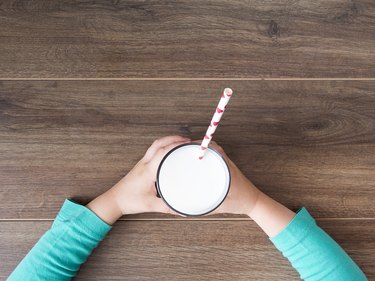
Milk is an excellent source of calcium and vitamin D, but if you have an upset stomach, you should avoid drinking milk and eating dairy products.
Gastroenteritis is a general term used to describe an upset stomach or inflammation in the intestines. It commonly causes nausea, vomiting, diarrhea, bloating, gas and cramping. It's not a good idea to mix gastroenteritis and milk as it may exacerbate your symptoms.
Video of the Day
Video of the Day
Following a gastroenteritis diet plan while you're experiencing symptoms will help to decrease the severity and longevity of the inflammation. If you are vomiting for more than two days, see a doctor.
Many Causes of Gastroenteritis
Gastroenteritis may accompany various conditions. For example, food poisoning, stomach flu and rotavirus are all conditions that cause gastroenteritis. Food allergies and intolerances can also cause the lining of the intestines to become inflamed and irritated, leading to typical gastroenteritis symptoms.
A clinical diagnosis is required to properly treat your symptoms. Gastroenteritis may lead to dehydration if you fail to increase your liquid consumption. Excessive vomiting and diarrhea can quickly deplete your body of water.
Gastroenteritis and Milk
The National Institute of Diabetes and Digestive and Kidney Diseases recommends completely removing milk and other lactose-containing food from your diet until your diarrhea completely stops. Drinking milk can make your diarrhea worse due to the lactose content. Lactose is a carbohydrate in milk that your body has a more difficult time digesting when you have gastroenteritis.
Milk and lactose are found in cheese, half and half, creamy soups and smoothies. Milk is also used in many unlikely products, such as hard candy, salad dressing and baked goods.
You may substitute milk with non-dairy alternatives such as rice milk, soy milk or coconut milk until your condition improves. Eliminate any type of food or beverage that could further aggravate your digestive system, such as alcohol, caffeine or fatty foods.
Read more: Should You Cut Dairy From Your Diet?
What You Can Eat
To avoid stomach upset, your gastroenteritis diet plan should go in stages based on your tolerance. If you're unable to hold food down or you're experiencing diarrhea after you eat, the goal is to maintain hydration. Suck on ice chips and take small sips of water and juice throughout the day. An electrolyte drink may also be beneficial to replace both fluids and electrolytes.
As your gastroenteritis improves, you can slowly add solid food back to your diet. Stick with soft, bland foods to start, such as bread, rice, dry cereal, crackers, bananas, creamy peanut butter and lean sources of protein without added fats. Once your stomach has returned to normal, you can resume your regular diet. However, you may still want to be careful about drinking milk.
Read more: Foods to Eat to Stop Diarrhea
Yogurt May Help
Yogurt is the only milk product that is recommended by Mayo Clinic to treat gastroenteritis. Certain types of yogurt contain live and active cultures that can promote a healthy balance of bacteria in your colon, helping regulate your bowel movements.
Yogurt should be used under your doctor's supervision. Use only plain yogurt that doesn't contain any added sugar or artificial sweeteners. Eating diet or regular-flavored yogurt could make your condition worse. Eating yogurt containing probiotics — good bacteria — can also help build your immune system.
Reintroducing Milk to Your Diet
Do not reintroduce milk back into your diet if you are still having loose stools. According to NIDDK, it can take your digestive system a month or longer before it can digest milk properly without causing symptoms.
If you continue to develop gastroenteritis symptoms well after you should've recovered from your gastroenteritis after drinking milk, you may have another digestive condition related to milk such as lactose intolerance or a milk protein allergy. Consult with your doctor for an evaluation.